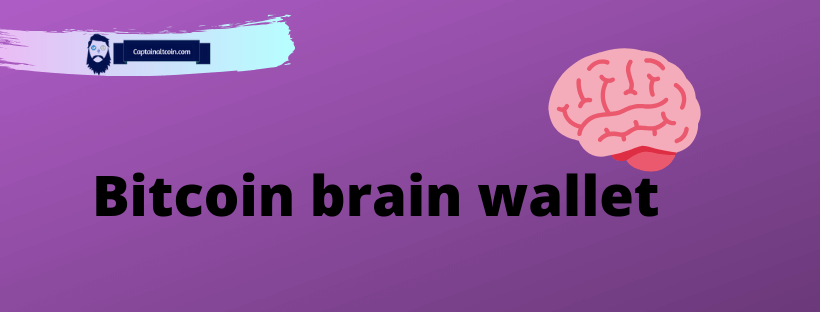
If you have trust issues with third-party services for securing your Bitcoins, perhaps it’s time you considered a more secure solution. Exchanges are vulnerable to attacks, fraud and other forms of illegal activity, smartphones can die, and you may lose your hardware wallets. For the ultra-paranoid and those who lose their sleep due to the safety of their Bitcoins, there’s only one storage option that’s impregnable to all known attack vectors – the brainwallet.
What you'll learn 👉
Bitcoin on the Brain
Bitcoin is a digital currency that’s not tied to a bank or government, but unlike a credit card or PayPal, it’s equally suited to the analogue world. It’s impossible to spend Bitcoin offline. However, it can be stored in the form of a paper wallet (by writing down your passphrase or key on a paper). If you take that approach one step further, by removing the paper, then you are left with a brainwallet.
Brainwallets, as apparent from their name, refer to the concept of storing Bitcoins in one’s own mind by memorizing a mnemonic recovery phrase. A brainwallet is where a user remembers their mnemonic phrase/private key and never writes it down, and it’s the only Bitcoin wallet that’s 100% impervious to phishing or hardware failure. However, it’s important to note that in some cases, if a user forgets the mnemonic phrase or goes into a coma or dies without telling anyone, then the associated Bitcoins or crypto-coins are lost forever.

That feel when too brainy for a hardware wallet.
Creating a brainwallet is as simple as memorizing the wallet’s mnemonic recovery phrase, and if you prefer absolute privacy, you can also memorize the address of your wallet. With this, there will be no digital or paper trail tying you to your coins.
There are various reasons why creating an invisible wallet might be very desirable. Mistrust and paranoia are probably number one. However, this is also a great solution for anyone who trusts their memory better than they trust third party technology.
This method is a much more secure way to store your Bitcoins because the only way someone can gain access to your Bitcoins is by forcing you personally to tell them your private key. For example, if you need to pass through US Customs, a brainwallet is one repository that’s guaranteed to be off-limits to curious TSA agents. They may confiscate your hard drive wallets, but they can’t confiscate your brain.
How to Create Your Own Bitcoin Brain Wallet
To make your own brainwallet all you need is, of course, your brain and a mnemonic seed generator, such as Armory, Mycelium, and Electrum. There’s also Brainwallet.io, a deterministic Bitcoin address generator, which appeared online in 2015 and is licensed under the MIT License (MIT). It enables you to keep your passphrase in your memory after generating an address in your browser. The tool promises zero data retention, and the Github storage of the site can also be inspected for those of a cautious disposition – and if you’re considering a brainwallet, that’s you.
Read also:
There aren’t many do’s and don’ts when it comes to generating a brainwallet. However, the following is an absolute don’t – never use an existing phrase as your passphrase because if someone is able to guess your passphrase, you will lose all of your funds in an instant.
People have created scripts which can search through millions of wallet addresses and try known phrases against them, which means that your favorite Kate Perry lyrics or bible verse is not recommended. Instead, users are advised by all brain wallet generators to use a genuinely random sequence of words and choose a passphrase which is hard to guess.
Brainwallet.io lets you drop any file into the text box in order to ensure true randomicity. Your browser will then perform a SHA256 hash and provide you with a Bitcoin private key/Bitcoin public key pair.

What does your memory palace look like?
How to Remember Your Mnemonic Key
The simplest way to ensure you never forget your passphrase is to write it down on a piece of paper and store it in a very safe place where you keep other important documents.
This is recommended if you are traveling from one place to another, as you can leave a backup at home in case your memory fails you. However, writing down the key simply defeats the purpose of a brainwallet, so if you want to stay true to the spirit of the game, you’re going to need to remember, and remember good. In order to do so, you’ll have to create a memory palace. Here is an example key:
witch candies piano pear
To memorize this, you’d take a familiar place, such as your grade school and build a visual series. You came to school and opened the door to your classroom to find a witch as your music teacher. She danced and offered candies to each student before the piano lesson. As you were preparing for the class, she sneezed and a yellow pear came out of her nose.
Memory palaces can be quite silly, but that’s what makes them so effective. For those who want to learn more about memory palaces, I can recommend an excellent book – Moonwalking with Einstein: The Art and Science of Remembering Everything.
Conclusion
Creating a brainwallet may seem excessive. However, if you trust your memory, you are guaranteed to have a storage that is safe from quantum algorithms and hackers. And the best of all, it costs zero dollars because you don’t need to subscribe to a storage service or buy any device.
Bitcoin Brain Wallet Pros and Cons
Pros
- Brainwallets are always safe from hacking.
- Only you know the mnemonic in your brain. This means that you just need to trust your memory.
- No written record or possibility of an online hack.
Cons
- You can get kidnapped if someone gets to know that you have a lot of money in your brainwallet.
- There is no written backup, which means that if you forget your mnemonic phrase, your funds will be lost forever.
- If you suffer from any medical condition like dementia or amnesia or if you go to coma, you will lose your coin keys with you.
- You stand at risk of being attacked if you don’t use a sufficiently strong passphrase.
- There are 365 x 24 x 7 programs running and trying to figure out the passphrases by clubbing frequently used words, common names, and different combinations.







